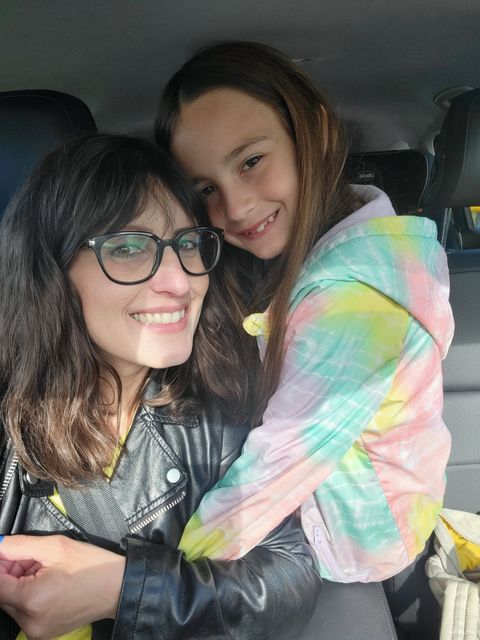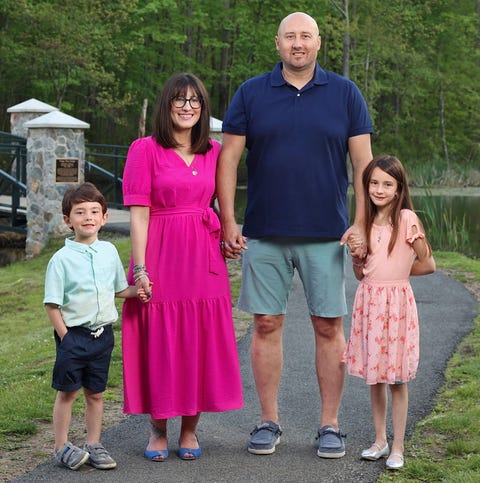Joelle Speranza
While I watched my 7-year-old daughter and 5-year-old son play catch with their friends as we were camped out on a crowded field in town, waiting for the Fourth of July fireworks to begin, I couldn’t help but think, I hope we are safe here. While the children were oblivious to the news of the Highland Park parade shooting earlier that day, where eight were killed and 29 were injured, it was top of my mind. The victims and other people in attendance included parents with young kids just like our family—people who were excited to celebrate a long weekend, unplug from the stress of the week and world, and just enjoy the moment. But those moments at the parade turned into their last, as they scrambled to protect their children and their own lives.
I wondered if there was a mass shooting situation during our town’s fireworks, would we even hear it over the explosions in the sky? It was dark outside—which way would we run? Which of my two kids would flee with me, and who would my husband grab?
The anxious loop of worry that becoming a parent can bring on or ratchet up is all we know.
As tragedies in the news continue to pile on top of each other, moments that we used to take for granted as parents, like simply hanging out with our kids, are being interrupted by anxious thoughts about our safety, which experts I spoke with say is a totally natural and understandable response. “Whenever tragedy hits, our empathic systems kick into gear, and we automatically play and replay what it must have been like for those who underwent the terror,” says Michele Kambolis, a mind-body health specialist, registered therapist, meditation teacher, and author of When Women Rise: Everyday Practices to Strengthen Your Mind, Body, and Soul. “Our minds ruminate and review the scenes of the event because we’re trying to process the unimaginable. And as a parent, we can’t help but worry about our own child’s safety and uncertainty of the world they are living in.” For those with very young children—born right before or during the pandemic and onslaught of current social and political issues—the anxious loop of worry that becoming a parent can bring on or ratchet up is all we know.
No matter how old your kids are, the current cycle of bad news, tension, and anxiety piled on top of whatever else is going on in your life means suiting up daily for another round of mental and emotional Olympics. We’re coaching our families and steeling ourselves to keep it together in front of our kids, maintain healthy home environments, work, and do our best to preserve the innocence of childhood. To parent effectively during these times and protect your own well-being, you need a game plan.
Until now, my go-to play has been the fake-out—steeling myself to hold it together and appear like everything is normal until my kids are well out of sight. I first heard about the mass shooting at Robb Elementary when I checked my phone during my daughter’s softball game. But I had to quickly bury my emotions, tap open my camera app, and photograph my girl at bat. The next morning on the ride to school, I recalled with angst her telling me that during a recent lockdown drill, she was in the bathroom and ran down the hallway to her classroom instead of hiding in a stall as instructed. Instead of clueing her into how I was feeling, I kissed her goodbye a few times for good measure, wished her a great day, and told her our special phrase, “My heart is in your heart.” I lowered the music and watched as she walked past extra cops on her way into the building, far from my protection. Driving away, I unleashed tears, smearing mascara across my face.

Selfie of the author and her daughter.
Joelle Sperazna
“As a general rule, it is best to take time to process and regulate your own emotions surrounding upsetting events before sharing this information with your child,” says Monica Vermani, clinical psychologist and author of A Deeper Wellness: Conquering Stress, Mood, Anxiety and Traumas. But eventually talking to our kids about how we’re feeling is an important next step. “Our children watch us, and they know when we’re upset, distracted, stressed, or worried,” says Vermani. “It is important to be open and honest with our children and share age-appropriate information about whatever we may be upset with,” agrees Andrea Dorn, psychotherapist and author of When Someone Dies: A Children’s Mindful How-To Guide on Grief and Loss,
When speaking to your kids, Kambolis advises parents to model mindfulness of emotion by naming it as compassionately as they can: “You might let your child know, ‘I’m noticing that my mind is really racing today, do you ever notice that in yourself?’ Or ‘My heart is really beating fast; sometimes the body thinks it’s in danger when it’s not. I think I’ll just pause and take a few deep breaths. You can join me if you need that too.'”
Still, “While healthy expression of emotions and coping strategies are important for our children to see, life goes on and there are times where we have to push through and push on,” says Dorn. “As a parent, this can feel incredibly difficult and energy-depleting. We each have to find coping skills that work best.”
How do I balance letting my guard down while we’re out with the vigilance my mind requires?
Though it’s been hard for me to move past my anxiety after Robb Elementary, I have been trying to become more adventurous, taking our kids to public places with lots of people, like Liberty Science Center and even the fireworks. I want them to have fun experiences and not let my fears dictate what we do. How do I balance letting my guard down while we’re out with the vigilance my mind requires—because my fears are valid, our world is a mess—without channeling that emotional hurricane to my kids?
Dorn advises grounding yourself in the moment. One way to do that is through square breathing. “Inhale for four counts, hold for four counts, exhale for four counts, hold for four counts, and repeat. Do this five to 10 times,” explains Dorn. Although many may have heard this before, few of us actually do it. She also notes that whenever the time isn’t right to process your feelings, you can try to focus on distractions like work, cleaning, playing with your kids, moving your body, or reading, until you come back to process.
Another tactic is to “avoid negative stimuli, including overexposure to the endless cycle of media attention on distressing events,” says Vermani. Kambolis agrees, adding, “The more we witness the sights and sounds of tragedy, the more it is wiring and rewiring into our neurobiological system. Instead, come into the moment, and focus on what’s happening right here, right now. By focusing on the sensation of the ground beneath you, the sounds in the room, or the taste of the cup of tea you’re sipping, you can teach the mind to hold both the tragedy and the beauty that still exists.”

Joelle Speranza with husband and children
Joelle Speranza
Keeping things in perspective and replacing negative thoughts with positive ones are other strategies suggested by Vermani. “Challenge catastrophizing thoughts with realistic thoughts that are supported by facts, rather than fueling worries and ‘what if’ statements. Remind yourself that life only comes with what you can handle and we are all in this together, managing and trusting we can move on to the next moment.”
To get to that next moment, Kambolis says, “When times are difficult, there’s one question that can cut right through the panic and grief and bring you home to your own healing. That question is: ‘How can I be kind to myself right now?’”
How can I be kind to myself right now?
In the big picture, all experts point to self-care being of utmost importance and want you to recognize when you need support. Vermani stresses, “Establish a relationship with a mental health professional who you can call upon to help bring in perspective or give you coping skills in times of high stress, depression, and anxiety.”
I coincidentally had an introductory virtual appointment with a licensed professional counselor a couple of days after the tragedy. I told her that I was reaching out because I want to be the best version of myself for myself and my kids. Learning tools to manage anxiety helped me in the past, and I want to continue my self-improvement journey. I want to be able to give my children those tools to carry on through tough times, and the courage to reach out when they need help. I also want them to know that wherever we are in this universe, we will always be one. Our cherished mantra is “My heart is in your heart,” so they know when things seem like they are falling apart, our hearts are always intertwined with love and beating together.
Related Stories
This content is imported from OpenWeb. You may be able to find the same content in another format, or you may be able to find more information, at their web site.
[ad_2]
Originally Appeared Here